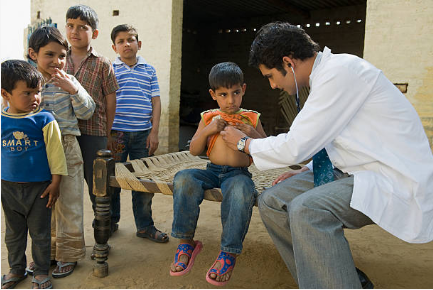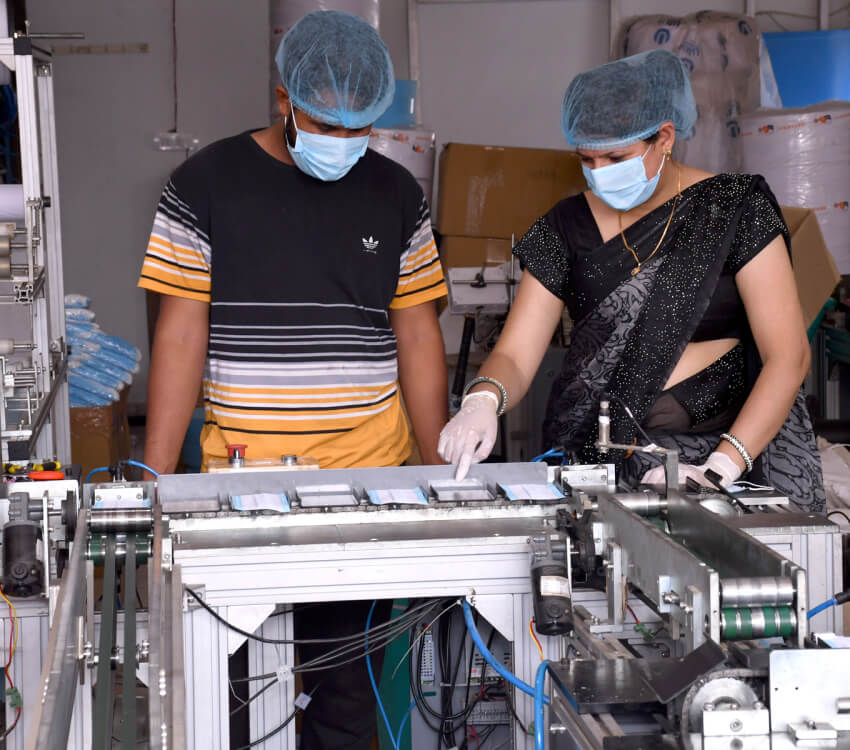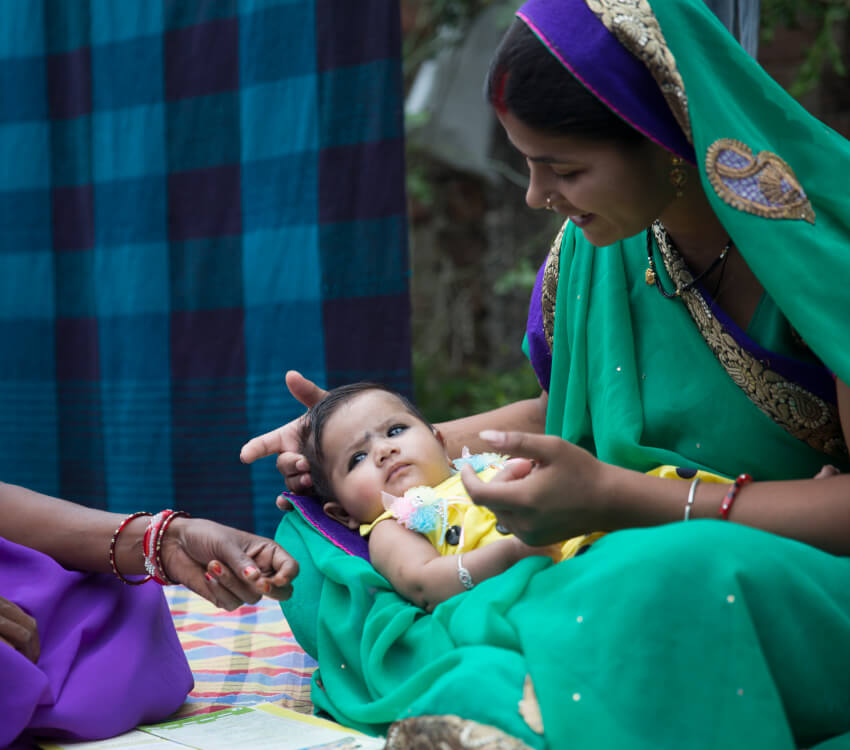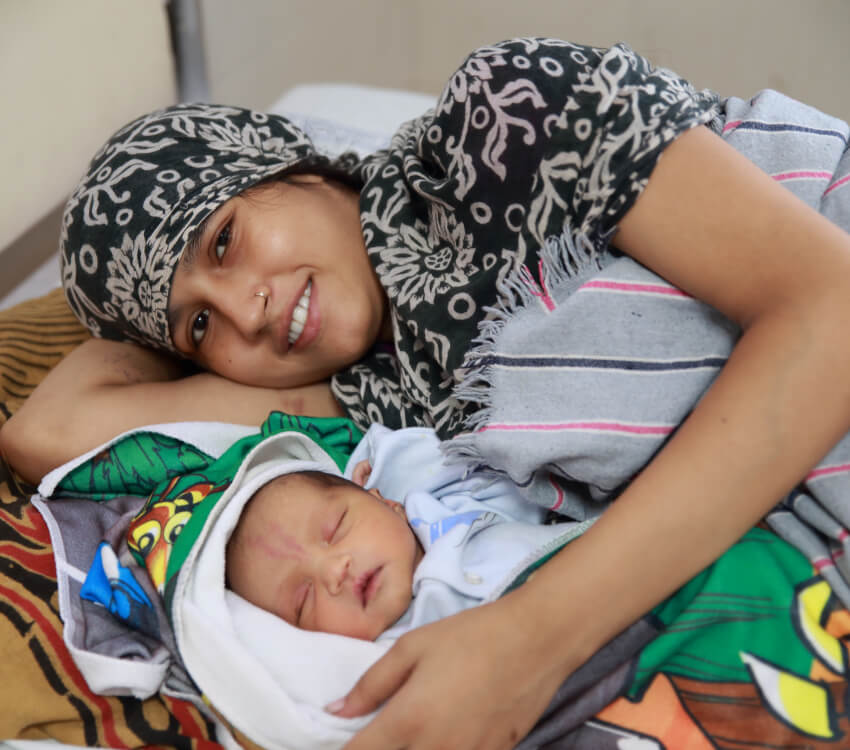INNOVATING FOR A SMART FUTURE
Building Trust for
Today and Tomorrow
We create long term value for all our stakeholders. Integrating people, technology and innovation, our services and solutions deliver sustained outcomes and builds trust among clients and communities to help them transform and grow.
Health Nutrition & Wash
Sustainable Access to Markets and Resources for Innovative Delivery of Healthcare (SAMRIDH), India
SAMRIDH
Sustainable Access to Markets and Resources for Innovative Delivery of Healthcare (SAMRIDH), India
Sustainable Access to Markets and Resources for Innovative Delivery of Healthcare (SAMRIDH), India
India’s first healthcare focused blended finance facility, SAMRIDH aims to catalyse market solutions and innovations to improve access to affordable and quality...
300 Million+
Mobilised through India’s First Healthcare Blended Finance Facility
16,000+
Medical Staff, Community Health Workers & Nurses Trained
1200+
Health Facilities Reached
23 Million+
People Reached
Norway India Partnership Initiative (NIPI)
NORWAY INDIA PARTNERSHIP INITIATIVE (NIPI)
Norway India Partnership Initiative (NIPI)
NIPI aims to provide strategic, catalytic, and innovative support to India’s National Health Mission (NHM) by testing scalable interventions in four high focus states of Bihar...
10 of 11
Scale-up of 10 of 11 NIPI Innovations with Government of India
7,00,000+
Newborns & 5000+ Mothers Reached
40,000+
Health Functionaries Trained
SAMVEG: Systems Approach for MNCH focusing on Vulnerable Geographies, India
SAMVEG
SAMVEG: Systems Approach for MNCH focusing on Vulnerable Geographies, India
SAMVEG aims to fill critical gaps in health systems, encourage innovations, scale-up & sustain interventions to improve Maternal, Newborn...
3.5 Million+
Pregnant Mothers and 3.1 Million+ infants to be given equitable access to MNCH services
13 Million+
Children (under the age of 5) to benefit from scale-up of MNCH good practices
Enhanced capacity building for public and private sector stakeholders
Health Nutrition & Wash
Sustainable Access to Markets and Resources for Innovative Delivery of Healthcare (SAMRIDH), India
SAMRIDH
Sustainable Access to Markets and Resources for Innovative Delivery of Healthcare (SAMRIDH), India
Sustainable Access to Markets and Resources for Innovative Delivery of Healthcare (SAMRIDH), India
India’s first healthcare focused blended finance facility, SAMRIDH aims to catalyse market solutions and innovations to improve access to affordable and quality...
300 Million+
Mobilised through India’s First Healthcare Blended Finance Facility
16,000+
Medical Staff, Community Health Workers & Nurses Trained
1200+
Health Facilities Reached
23 Million+
People Reached
Norway India Partnership Initiative (NIPI)
NORWAY INDIA PARTNERSHIP INITIATIVE (NIPI)
Norway India Partnership Initiative (NIPI)
NIPI aims to provide strategic, catalytic, and innovative support to India’s National Health Mission (NHM) by testing scalable interventions in four high focus states of Bihar...
10 of 11
Scale-up of 10 of 11 NIPI Innovations with Government of India
7,00,000+
Newborns & 5000+ Mothers Reached
40,000+
Health Functionaries Trained
SAMVEG: Systems Approach for MNCH focusing on Vulnerable Geographies, India
SAMVEG
SAMVEG: Systems Approach for MNCH focusing on Vulnerable Geographies, India
SAMVEG aims to fill critical gaps in health systems, encourage innovations, scale-up & sustain interventions to improve Maternal, Newborn...
3.5 Million+
Pregnant Mothers and 3.1 Million+ infants to be given equitable access to MNCH services
13 Million+
Children (under the age of 5) to benefit from scale-up of MNCH good practices
Enhanced capacity building for public and private sector stakeholders

WHO
Outsourcing of Payrolling, Management and Administration of Field Monitors to be Deployed Across the Country for WHO-India National Public Health Support Programme (NPSP) Field Operations
WHO
WHO in collaboration with the Government of India (GoI), established the ‘National Polio Surveillance Project’ (NPSP) in 1997 to provide technical support in key areas of surveillance for polio and mass vaccination campaigns. The last case of wild poliovirus was detected in India on 13 January 2011 and WHO certified India ‘Polio Free’ on 27 March 2014. Over the years, NPSP’s role has expanded to include support to additional public health areas…

WHO
Outsourcing of field manpower to support the India Hypertension Control Initiative (IHCI)
WHO
The India Hypertension Control Initiative (IHCI) aims to reduce death and disability due to CVDs by improving the control of hypertension, reducing salt consumption, and eliminating artificial trans-fats, the leading risk factors for CVDs. The interventions will complement the new government initiative for universal screening and management of hypertension, diabetes and three common cancers. The project is being implemented in 75 districts implementing IHCI across 16 States…

WHO
To provide technical support to the Government of India for the Implementation of Midwifery Care Programme through a Central Coordination Unit (CCU)
WHO
As part of the programme implementation, WHO Country office India is supporting the Maternal Health Division, Ministry of Health in operationalising the midwifery initiative in the country through normative support in developing technical guidance documents, support for the training of first batch of Nurse Practitioners in Midwifery Educators, monitoring framework for midwifery programme and techno-managerial support at national level through a Midwifery Central Coordination Unit. At the request of the Government of India, WHO is supporting the Midwifery Central Coordination Unit (CCU) to assist the rollout of midwifery initiative and establishing midwifery led care services in the country. The Central Coordination Unit (CCU) works in close coordination with the Joint Secretary (RCH) and Maternal Health Division, Ministry of Health and Family Welfare, Government of India and under the direct guidance and direction of WHO Country Office for India…

WHO SEARO
Developing a guide on Short Programme Review on Reproductive, Maternal, Child and Adolescent Health, Pan India
WHO SEARO
The Short Programme Review (SPR) is a process for reviewing the progress of “Reproductive, Maternal, Newborn, Child and Adolescent’s Health” (RMNCAH) at the National or Sub National level. This is an evidenced-based review, to help an RMNCH+A programme assess and readjust their course at National/Sub National level to achieve goals which includes assessing progress toward programme goals and objectives where data are available and how well the programme implemented its plans in to deliver RMNCAH interventions. It also entails identifying the problems the programme has faced and suggest solutions, developing recommendations about what the programme needs to do and decide on next steps for incorporating recommendations into the workplan…

FCDO/British High Commission
The UK-India Digital Health Landscape Analysis, Delhi
FCDO/British High Commission
The UK and India have committed, as part of the PM-PM 2030 Roadmap, to work together on Digital Health, with the ambition of promoting “Joint Research and Policy Engagement on Health Data for Predictive and Precision Healthcare focusing on Machine Learning and Artificial Intelligence”. To understand better the landscape of digital health and areas that need to be prioritised for this collaboration to create sustained impact, the Foreign, Commonwealth, and Development Office is commissioning a study. The study will compile a list of institutions working in the field of digital health in the United Kingdom and India. They will also identify the core strengths and weaknesses of these institutions, as well as areas of opportunity if they collaborate. The study will also identify potential challenges that may arise because of collaboration. It will also map institutions that complement one another in terms of their expertise and identify existing collaborations to reduce duplication. The study entails…

DoHFW, Government of Meghalaya
Project Management Agency (PMA) to support implementation of Meghalaya Health Systems Strengthening Project (MHSSP)
DoHFW, Government of Meghalaya
The Government of Meghalaya is committed to improving the health status of its citizens. Despite considerable challenges, the state has shown progress in various health indicators over the last decades. To further accelerate the progress, the Department of Health and Family Welfare (DoHFW), Government of Meghalaya, with technical and financial support from the World Bank, is implementing the ‘Meghalaya Health Systems Strengthening Project’ (MHSSP) in the state. The MHSSP intends to improve accountability, quality and utilisation of health services in Meghalaya, especially among public facilities at Primary Health Center (PHC), Community Health Center (CHC) and District Hospital (DH) levels…






